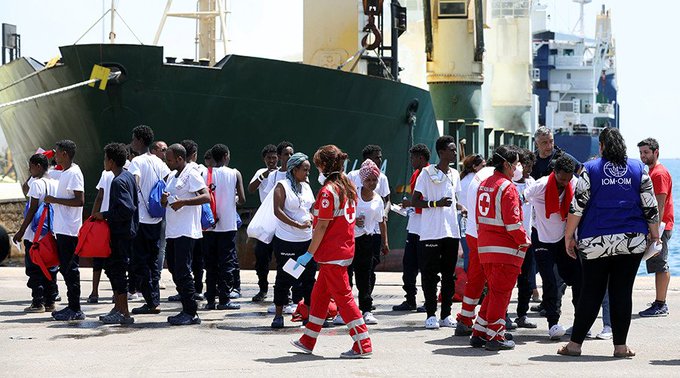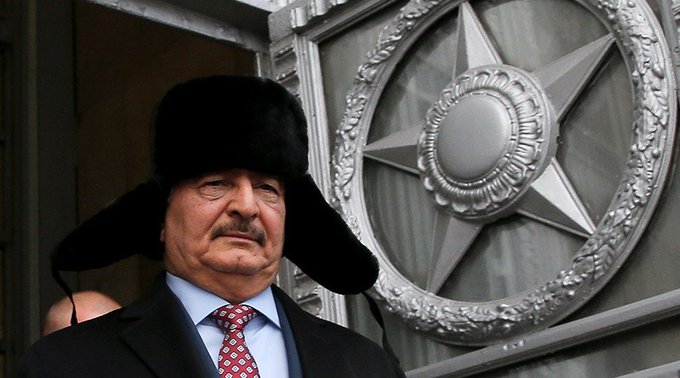Libya: Russia moves for UN solution, but little hope in sight for EU immigration crisis
Martin Jay is an award winning British journalist now based in Beirut who works on a freelance basis for a number of respected British newspapers as well as previously Al Jazeera and Deutsche Welle TV. Before Lebanon, he has worked in Africa and Europe for CNN, Euronews, CNBC, BBC, Sunday Times and Reuters. Follow him on Twitter @MartinRJay

A peace process to unite warring Libya is about to kick off. Russia is once again showing the West diplomacy is the only hope for the country which has been wrecked by the West’s meddling. But will a peace process also hold the EU to account?
After six years of Libya divided by two power blocs and a civil war, there appears to be light at the end of the tunnel. Russia is pushing for peace talks between the leaders of this troubled North African country which could signal a turning point, a new start for a country ravaged by the aftermath of a botched Western ‘intervention’ in 2011.
Just this week, the army chief – and leader of its eastern bloc – came to Moscow at the invitation of Russian Foreign Minister Sergey Lavrov, the first of many steps toward kick starting what will inevitably be an arduous peace process which could go on for months, even years. But it’s a start.
Now, Field Marshal Khalifa Haftar will have to wait and see if his counterpart – the UN-backed Prime Minister of the Libyan Government of National Accord Fayez Sarraj will agree to attend peace talks in the coming weeks. There are good indicators that he will. At the end of July, both he and Haftar met with French President Emmanuel Macron and agreed to a ceasefire.
What was interesting about the Lavrov meeting, was the method Lavrov suggested for restoring the country and building a state: he believed the correct process now would be via the United Nations. It was a smart move. Lavrov probably sensed that given the UN’s failure in Libya – indeed, many could argue that the state of the country presently is as a direct result of the UN and the West’s ill-conceived intervention – pride would not let the West allow Russia to take all the credit for saving Libya. After all, giving the UN a second shot at Libya is clever on many levels, but this time it would be with Russia, as part of the bigger plan.
The West always appears to be the talkers, and the Russians those who do stuff.
Ironically, it is Russia who walks the walk on diplomacy (Syria and now Libya) while only the US manages to talk the talk (James Mattis, on North Korea crisis).
But what can be achieved and where did it all go wrong before?
Libya’s double role with the West
Perhaps many would argue that despite Russia abstaining on the UN Security Council resolution to install a no fly zone and bomb Gaddafi’s military positions in 2011, the West still went too far, and the plan itself quickly went awry.
In the early years – 2011 to 2015 - the West was naive in that it believed simply destabilizing Gaddafi would be enough to bring about his removal, and a new state-building momentum would follow, what the Washington Post called “nation building by proxy.”Unfortunately, despite arming Al-Qaeda groups to overthrow Gaddafi, America, in particular, underestimated just what chaos would ensue, due to the high number of weapons in the hands of militias, and the rushed elections which followed only fanned the flames of civil war. There were plenty of respected academics in Libya at the time who warned as much, but no one was listening.
It’s as though the West refuses to learn from history that merely overthrowing dictators in the Middle East or its periphery – without a bigger plan - is only a recipe for calamity. And yet it still does it. Iraq, Libya and some believe Syria also.
What Lavrov and the West will now have to deal with is that the half baked plan in Libya – from the off in 2011 and also since 2015 where it backed a new government which controls the West of the country – has effectively created two ‘regimes.' Both camps believe they have legitimacy as incumbent governments and have support from heavily armed militias on both sides.
But it’s the West’s banal obsession with Libya which it believes it can control, exploit and use as a scapegoat when needed, which has further contributed to the chaos.
If we go back even more from 2011, Tony Blair, Nicholas Sarkozy and the EU itself brought Gaddafi in from the cold each with their own agenda. For Blair in 2004, it was getting Gaddafi to scrap his WMD program and providing a breakthrough in the hunt for the killers of WPC Yvonne Fletcher shot dead outside the Libyan embassy in London in 1984. The Blair deal included lucrative benefits like Shell, the Anglo-Dutch conglomerate, signing a £550 million gas exploration agreement. For Sarkozy, (who, in 2005 was France's interior minister) was later to face an investigation into whether Gaddafi had financed his presidential campaign of 2007 to the tune of $50 million.
They all considered Libya low hanging fruit in terms of geopolitical spoils, an easy nut to crack given that the country was under populated, primarily a single ethnic makeup (Sunni Muslims) and a leader who was simple, in that he was not entangled in the Arab world. Indeed, the fact Gaddafi was an autonomous odd ball played against him when the US decided to finger him for the 1988 Lockerbie bombing of a Pan Am flight over Scotland. Today, the records show the US at the time believed it was Syria which was behind the bombing but, at that time its leader Hafez Assad was too powerful and well connected to hit, so Libya was the perfect patsy.
The EU also has to accept some blame for the mess of Libya. At the time Blair was photographed in an awkward hug at the first meeting in 2004 (DO you refer to any particular moment? I found this with the Libyan leader, Brussels also saw Gaddafi as a God send. I was part of a group of journalists who, in 2004, saw Gaddafi and listened to his views. He arrived in the European Commission with a sizzling entourage of female body guards kitted out in tight-fitting blue fatigues and I, like others, laughed at his attempts at humor. The Libyan leader didn’t get that we found his failed attempts at humor funny in itself. He thought we were chuckling at his jokes.
EU officials were also smiling though but more because of their dream of tapping into Libyan oil; such was their zeal to rid Europe of its energy dependency on Russia, as my investigations revealed years later.
The EU and Old Europe are still there using Libya for whatever needs they require. In the case of Emmanuel Macron, the French leader making the record books for his popularity tail spin dive is ready to feed at the publicity trough that Libya offers. It befits a leader who is entirely bereft of anything accept an obsession with his image. Macron also wants to play a prominent role in the peace talks which are hoped to roll out, and although it is not stated, we can assume Prime Minister Sarraj is his man.
And so everything is neatly falling into place. All Russia and France now need is to use the UN as a gilt-edged international partner who can help facilitate peace in Libya. They have some herculean challenges ahead and huge questions to ask, chiefly whether this new talk shop will acknowledge the mistakes of the UN and the Americans in the past. Ideally, Russia needs to open back channel discussions with the French now and consider the idea of a multi-national peace keeping mission there, as institutions are rebuilt, and the polarized set up can be taken down, brick by brick. Taking almost one million guns off militias also will be challenging and will probably end up being costly.
One other milestone Russia, France and its partners in the UN might consider is holding the EU much more to account over the immigration issue. Most Western pundits erroneously attribute the catastrophe in the Mediterranean as a failure of the EU to have a galvanized policy in how it polices its waters. We should never under estimate the extent of how useless Federica Mogherini is, as EU foreign policy tsar to get any backing from Paris and Berlin to do anything on the foreign policy circuit, in fact, let alone stop, or curtail the illegal flow of immigrants from Libya to the EU’s shores.
The EU's gob-smacking impotence is only matched by its wholesale corrupt agenda which has produced these flows in the first place. A new UN peace process on Libya might want to ask the EU to hold the leaders of many African countries to account more for human rights atrocities like in the Central African Republic for example – the same countries which the EU gives hundreds of millions of euros to, simply to bribe and coerce those governments, in my view, to assist Brussels in its PR program to make itself look more relevant and a global player. It’s hard to see how the €360 million of state-building ‘aid’ given to CAR, as just one example, is helping crack down on torture, rape and a plethora of ugly human rights atrocities, but is more to assist the EU with its delusional view it is a global player.
Comically, if the EU were a global player, it would have dealt with the Libya problem years ago, but apparently, not Gaddafi, nor the present leaders of the country take Brussels remotely seriously. And it must hurt Mogherini that once again a big gun in Europe – France - has bypassed her grandiose office and taken the reins on what should have been an EU initiative. Or perhaps she was too busy to take the call, up to her eyes with selfies with Iranian MPs?
Martin Jay is based in Beirut and can be followed at @MartinRJay
The statements, views and opinions expressed in this column are solely those of the author and do not necessarily represent those of RT.






0 Comments:
Post a Comment
Subscribe to Post Comments [Atom]
<< Home